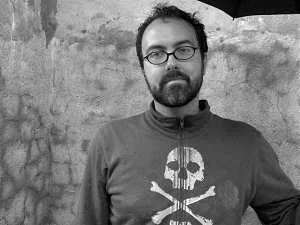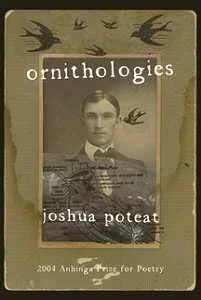Joshua Poteat
The last several years, Joshua Poteat has won awards from American Literary Review, River City, Nebraska Review, Marlboro Review, Columbia, Bellingham Review, Yemassee, Lullwater Review,Vermont Studio Center, Catskill Writing Workshop, American Poetry Archives/San Francisco State University, and Universities West Press. He won the 2004 National Chapbook Fellowship from the Poetry Society of America. In 2001, he was the Summer Writer-in-Residence at the University of Arizona's Poetry Center and, in 2002, was awarded an Individual Artist's Grant from the Virginia Commission for the Arts. Blackbird: an online journal of literature and the arts featured him in their Spring 2003 issue, and he has poems appearing in Crazyhorse and Gulf Coast. Prior to winning as the 2004 selection for the Anhinga Prize for Poetry, Ornithologies was a finalist for the 2001 T.S. Eliot Prize for Poetry from Truman State University Press, the 2001 and 2002 Philip Levine Prize in Poetry from California State University-Fresno, Copper Canyon Press' 2002 Hayden Carruth Award, the 2004 National Poetry Series, and the 2004 Bakeless Prize. His work was part of an international traveling exhibition entitled Pivot Points, featuring three generations of painters and poets, including Larry Levis, Dave Smith, Gregory Donovan, and others. Joshua lives in Richmond, Virginia, where he edits assorted texts, including art criticism in collaboration with the art historian Dr. Robert Hobbs.
ORNITHOLOGIES
BY JOSHUA POTEAT
$18.00. (email us for availability)
Robert Dana-Anhinga Prize for Poetry (2004)
This poet knows that ruin is no excuse for despair, and even as he combs the rubble for tokens of consolation, the presence among us of of these clear-eyed, large-hearted poems may serve a similarly hopeful purpose for readers of contemporary American poetry. -- contest judge Campbell McGrath
"With natural elegance and untiring invention, Joshua Poteat writes some of the most remarkable poetry you are ever likely to encounter. In storylines that move beyond the virtues of narrative into a region of wonder, combining violence and tenderness in an intimate voice capable of revelations as swift and sudden as the sear of lightning, his poems work themselves into the cloudy fabric of your imagination and reside there as unforgettable experiences." -- From Blackbird, Spring 2003, Vol. 2, No. 1
It is a lyricism that reminds me of James Wright, and this I mean certainly as praise, when he employed, as I called it, an intensified vernacular -- throwing me off my stride, gathering me to him by the detail of some earnest and often terrible beauty, in the easy language of our country with its sweet, oiled syntax.In this way Meditations is a dramatic book, a kind of word- or mood-theater. Poteat tells me things as if I were an audience but invisible. Or as if I were the moon. Yet something real passes between us, which is to say that the book is very good, that it leaves its mark... For here we are the audience of what is clearly an inner voice, flowing forward, throwing out its lovely perceptions, its lyrical lines of praise, its wonderment, its pursuit of moments and places, past and present, where mystery's veil for a moment sparks upward. -- Mary Oliver, judge for the 2004 Poetry Society of America’s Chapbook Award (regarding Poteat's award-winning Meditations)
From Meditations in the Margins of the Book of Irish Curses
i. In the middle of the field, may your horse kill you
Let it be a roan, without foal, without a crown
of honeybees circling her mane of clover.
The tongue of a bee is golden and can never
mourn the evening as it weaves through
the river birches, Nyssa Aquatica, named for
the water that sweetens its touch, and Pinus Palustrus,
long-leaf pine, named for the palace of cinder
above the river. Let it be the roan, please, without
holiness, or shame. May she throw my ribs to the graveyard clay
and make a cake from my legs of broken air.
May her tail, coarse as an orphan's wrist, sweep the bees
into my mouth that will never taste the river again.
How can the silence remain whole beneath the grass?
May she never know how much I loved her.
Nocturne: For the Aviaries
Then the rain came,
full of a sadness I've never seen before,
through the cottonwoods
and along the river,
which is no longer a river
but an apparition under the sand.
Had I five hummingbirds,
I would make a love charm
and string them from the tongue
of a small copper bell in those branches,
necks hovered together, broken.
Had I a swan, it would sleep
under the hives
with a bucket of fresh milk,
with the splintered white faces of goats.
To reclaim or take apart the night,
like the city does, carving through
the blind river?
The brilliant debris of stars, the air?
Nothing in this world is ours.


